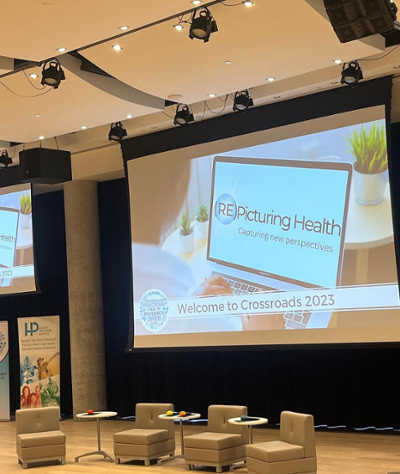Bilguundari Enkhtugs (Criminal Justice) presents at (Re)picturing Health: Capturing New Perspectives in Halifax!
Mon. Apr. 17, 2023
Bilguundari Enkhtugs recently returned from Halifax where she attended (Re)picturing Health: Capturing New Perspectives, the 19th Annual Crossroads Interdisciplinary Health Research Conference. Dari joined the conference to present “Experience of cyberbullying through the presentation of self: health consequences and needs,” a research paper based on her MA thesis for the Criminal Justice program.
We checked in with Dari when she got back. She told us more about her research, her time at the conference, and shared some photos from Halifax.
Can you tell us a bit more about the focus of your research?
My broad research interests include e-criminology, online victimization and punishment. My secondary area of interest focuses on community-based punishment, with a particular focus on probation and conditional sentences. My MA thesis The presentation of self in an online environment: Experiences of cyberbullying victims and perpetrators offers a qualitative phenomenological inquiry, through interview and visual methods, into how the University of Winnipeg undergraduate students define and (re)construct themselves in the virtual world compared with their physical world.
 Congratulations on being selected to present at (Re)picturing Health! What made you decide to apply?
Congratulations on being selected to present at (Re)picturing Health! What made you decide to apply?
I was curious to see how the study of criminal justice – in the context of my thesis research, online victimization, and mental health needs – intersects with health-based research, which is the main focus of the conference. The theme of the conference (Re)Picturing Health: Capturing new perspectives closely aligns with my findings, as my interview respondents stressed the importance on the need of actively seeking mental health help after their experiences of online bullying (or online victimization). Meeting this need is the way I re-picture access to mental health services and, thus, I believe this has led me to do an oral presentation at this conference.
Were there any connections between your research and discussions or panels at the (conference)?
I have gotten to know more about Dr. Spenser whose research is informed by the use of visual data! At this conference, I had the opportunity to attend her lecture supplemented by an interactive task of collecting and analyzing visual data on-site, which I found exciting. In my thesis, I use participant-generated visual data, so having to attend this lecture and making a connection with her was insightful.
Did you have a chance to connect with or socialize with any other students there?
I’ve made new friends from UBC, Carleton, McMaster, and Dalhousie. It was great to learn about their research (both heavily health-based and policy, service based) and exchange contacts!
What was the highlight of the conference for you and what are you going to take away from your experience there?
The way I saw how the study of victimization (and criminal justice, broadly) relates to health research and how the interdisciplinary aspect of social sciences can inform policies and practical guides on health services has opened my eyes. This was the highlight of attending the conference in addition to making new friends and visiting Halifax!
